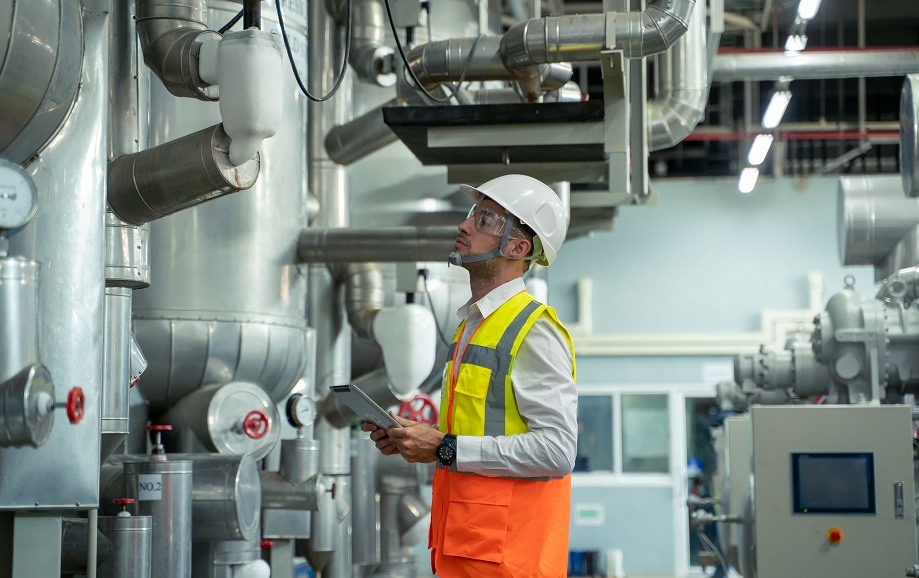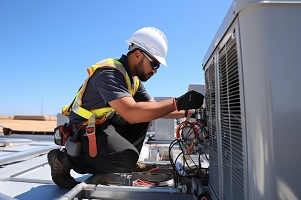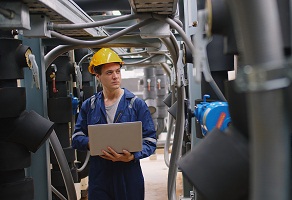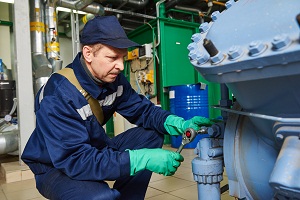
We all depend on refrigeration for our homes, places of work, businesses, and industrial complexes that store perishable items. Those who provide refrigeration services need specialized industrial refrigeration training to maintain the level of required cooling standards.
Refrigeration specialists begin their training in a general heating, ventilation, air conditioning, and refrigeration (HVACR) career program. From there they obtain industry certifications and continue their specialized training on the job.
HVACR Work Is Multi-Faceted
HVACR education and training prepares graduates for work in entry-level jobs in four technical areas. They may choose to work in one or more of them in their careers including:
- Refrigeration Systems
- Heating Systems
- Ventilation Systems
- Air Conditioning Systems
 As a generalist technician, workers install, repair, maintain, dismantle, and replace equipment and whole systems. They typically begin work as residential technicians and may choose to transfer to commercial or industrial work. Demand for HVACR workers is high because of the growing construction and remodeling growth. HVACR training also prepares workers for electrician jobs.
As a generalist technician, workers install, repair, maintain, dismantle, and replace equipment and whole systems. They typically begin work as residential technicians and may choose to transfer to commercial or industrial work. Demand for HVACR workers is high because of the growing construction and remodeling growth. HVACR training also prepares workers for electrician jobs.
For those who want to specialize in refrigeration work, it is exciting to know their skills are in constant demand. As our population grows, more products need to be cooled or frozen under ideal conditions. Job and career opportunities are available in virtually all states for those who are qualified.
Industrial Refrigeration Versus Commercial Refrigeration
Industrial refrigeration systems are generally larger and more complex than commercial refrigeration systems. They are more power-intensive and designed for efficiency on a larger scale. Here are some significant differences between the two systems:
Capabilities – An industrial unit can get down to temperatures as low as -40 degrees F, while commercial units freeze at 0 degrees F maximum.
Components – Industrial systems use different refrigerants than commercial systems. They operate at much lower temperatures and handle higher pressures.
Design – Commercial units are often smaller, modular, and focused on ease of access. Industrial systems are custom-designed, scalable, and built to withstand rigorous conditions and higher capacity requirements.
Energy Requirements – Commercial refrigerators are typically more energy-efficient and have lower operating costs.
Size and Capacity – Industrial refrigeration systems are used in larger-scale operations like manufacturing plants and warehouses. Commercial refrigeration is used in smaller-scale areas like retail, food, and medical industries.
| “Those who provide refrigeration services need specialized training to maintain the level of required cooling standards.” |
What You Learn In Industrial Refrigeration Training
 Industrial refrigeration training covers a wide range of topics in addition to commercial refrigeration training essentials. Students develop knowledge and skills related to:
Industrial refrigeration training covers a wide range of topics in addition to commercial refrigeration training essentials. Students develop knowledge and skills related to:
- Compressor training is conducted with different types of compressors including operation and maintenance.
- Students work with different types of condensers.
- Different types of cooling units.
- How to conserve energy.
- How to select and use evaporator coils.
- How liquid recirculation systems work.
- Refrigeration cycles show how heat is absorbed from a liquid to a vapor through evaporation, and then released from the vapor back to liquid through condensation.
- Physical properties of various refrigerants and tables that show the performance of different refrigerants.
- How to determine refrigerant vessel sizing.
Industrial refrigeration training can also help with refrigerator and air conditioning maintenance and repair.
Career Paths For Refrigeration Specialists
 Refrigeration technicians work with a variety of equipment such as walk-in coolers and systems that keep buildings, warehouses, trucks, storage spaces, and other climate-controlled areas cool. Some specific career paths include:
Refrigeration technicians work with a variety of equipment such as walk-in coolers and systems that keep buildings, warehouses, trucks, storage spaces, and other climate-controlled areas cool. Some specific career paths include:
- Service Technicians diagnose and repair industrial equipment, devices, and systems
- Installers install refrigeration systems in new construction or retrofitting existing buildings and facilities.
- Sales Representatives sell refrigeration equipment, systems, and service agreements to customers.
HVACR technicians are in high demand in larger facilities like factories, plants, hospitals, schools, and other facilities that need their services. Most employers prefer job candidates who have strong previous technical training experience. Some jobs are also available in Canada, Mexico, and other countries with additional training. The career services office at your college will offer valuable insight into this career.
Affordable Training That Increases Your Job Prospects
Increase your job prospects by earning an Associate of Occupational Studies (AOS) Degree in Air Conditioning, Refrigeration, and Electrical Technology. This ITI Technical College program prepares students for entry-level jobs in the industrial refrigeration industry.
If this type of work interests you, request more information and set up an appointment with one of our admissions representatives. You will quickly determine if industrial refrigeration training and you are a good match.
For more information about graduation rates, the median debt of students who completed the program, and other important information, please visit our website: https://iticollege.edu/disclosures/

